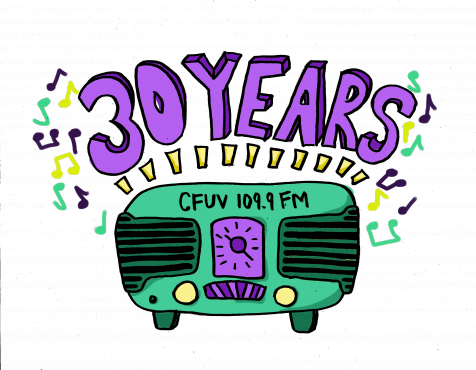The University of Victoria’s campus-community radio station turns 30 this December. And with increases in funding and new technologies, CFUV is only improving with age.
Fresh thinking and extra funds have allowed CFUV to adapt as younger generations shift away from traditional media formats. In addition to a Students’ Society levy, voted in by student referendum, the Federal government began funding campus-community radio stations in 2008. This money, and the enthusiasm of staff and over 200 volunteers, has led to advances such as the use of simulcast and on-demand streaming, podcasts, and YouTube videos of music filmed live in the station.
Serious reporting in the form of a Community Affairs program is another avenue CFUV has more recently taken, though the station stays away from breaking news.
“We can’t compete (with commercial radio),” says station manager Randy Gelling. “We try to go deeper, like dialogue-based, interview-based [programming] and radio documentaries. This is very resource heavy. This is where the extra funding has come in.”
The station has not always had so much to brag about. Campus radio began broadcasting in the ‘60s, but only became an FM station in December 1985. CFUV survived its early years with almost no funding. “On a good day we could barely hear some scratchy old records being played,” says Dan Beer, a musician who lived near UVic during the era when the station broadcast at 49.4 watts, compared to its 2290 watts today.
Despite such a bare bones existence, CFUV also managed to accomplish a lot in those early days. Of particular note was the acclaimed Blues show Let the Good Times Roll. Hosted by the highly respected Eric Leblanc, who passed away in September, the show had a solid run of 30 years. Gelling says it was “easily the best blues and jazz program in Canada, even North America.”
Stations like CFUV have also played an important role in the rise of the indie music scene, largely because they have never been restricted to playing what is already commercially popular. Gelling affirms, “Radio has a cultural impact that I think is underestimated. It’s still the main controller in both good and bad ways over mainstream musical culture . . . a lot of what commercial radio considers culturally valuable today was first given airplay on stations like CFUV.”
At 30, CFUV seems to be hitting its stride. The station provides quality broadcasting and opportunity for students and the community to learn modern journalistic practices. And while Gelling admits they are yet to completely overcome “campus-community radio’s reputation of people being stoned on the air, giggling, playing their tunes and ranting about conspiracies,” CFUV has matured. The years of experience and support are securing its standing as a contemporary source for news and entertainment both on and off campus.







